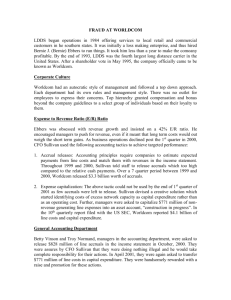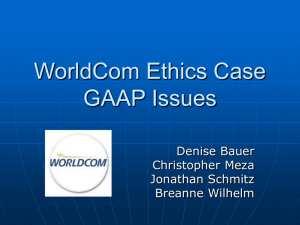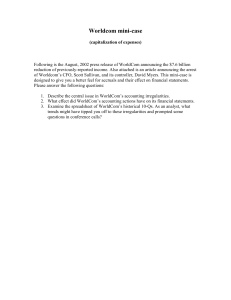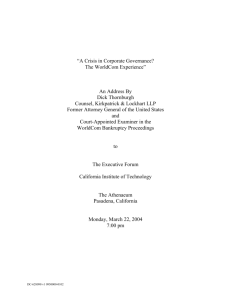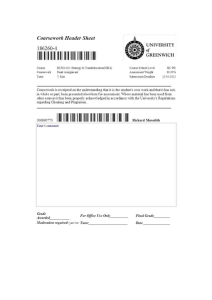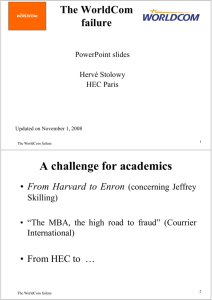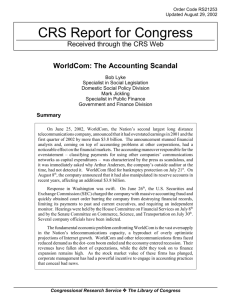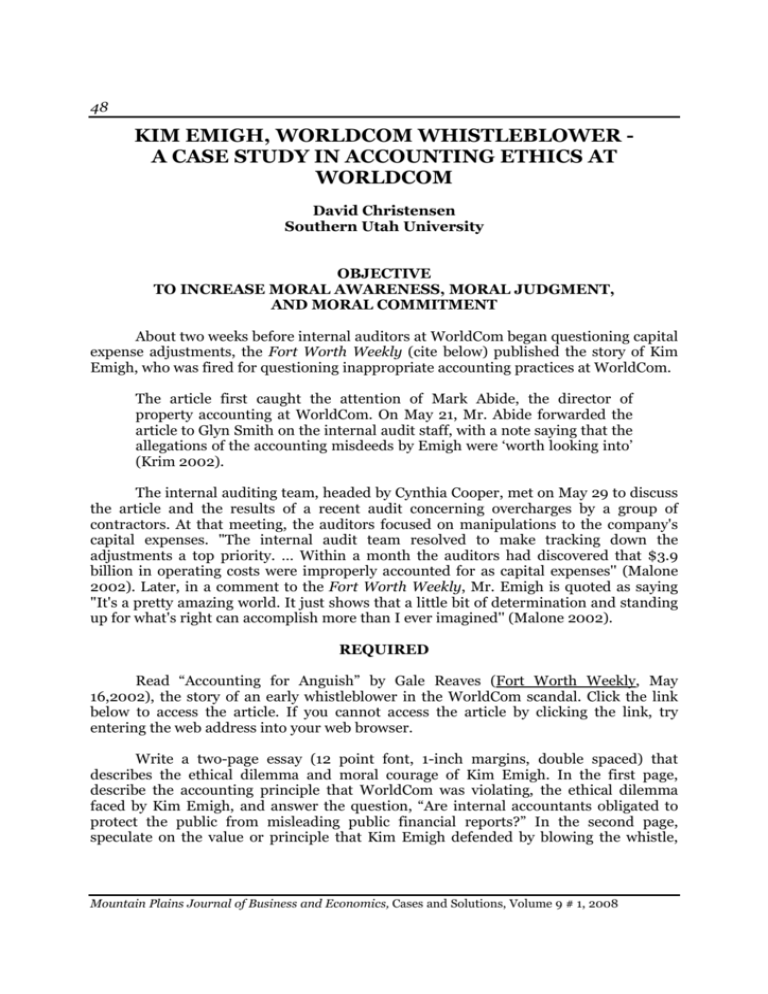
48
KIM EMIGH, WORLDCOM WHISTLEBLOWER A CASE STUDY IN ACCOUNTING ETHICS AT
WORLDCOM
David Christensen
Southern Utah University
OBJECTIVE
TO INCREASE MORAL AWARENESS, MORAL JUDGMENT,
AND MORAL COMMITMENT
About two weeks before internal auditors at WorldCom began questioning capital
expense adjustments, the Fort Worth Weekly (cite below) published the story of Kim
Emigh, who was fired for questioning inappropriate accounting practices at WorldCom.
The article first caught the attention of Mark Abide, the director of
property accounting at WorldCom. On May 21, Mr. Abide forwarded the
article to Glyn Smith on the internal audit staff, with a note saying that the
allegations of the accounting misdeeds by Emigh were ‘worth looking into’
(Krim 2002).
The internal auditing team, headed by Cynthia Cooper, met on May 29 to discuss
the article and the results of a recent audit concerning overcharges by a group of
contractors. At that meeting, the auditors focused on manipulations to the company's
capital expenses. "The internal audit team resolved to make tracking down the
adjustments a top priority. … Within a month the auditors had discovered that $3.9
billion in operating costs were improperly accounted for as capital expenses'' (Malone
2002). Later, in a comment to the Fort Worth Weekly, Mr. Emigh is quoted as saying
"It's a pretty amazing world. It just shows that a little bit of determination and standing
up for what's right can accomplish more than I ever imagined'' (Malone 2002).
REQUIRED
Read “Accounting for Anguish” by Gale Reaves (Fort Worth Weekly, May
16,2002), the story of an early whistleblower in the WorldCom scandal. Click the link
below to access the article. If you cannot access the article by clicking the link, try
entering the web address into your web browser.
Write a two-page essay (12 point font, 1-inch margins, double spaced) that
describes the ethical dilemma and moral courage of Kim Emigh. In the first page,
describe the accounting principle that WorldCom was violating, the ethical dilemma
faced by Kim Emigh, and answer the question, “Are internal accountants obligated to
protect the public from misleading public financial reports?” In the second page,
speculate on the value or principle that Kim Emigh defended by blowing the whistle,
Mountain Plains Journal of Business and Economics, Cases and Solutions, Volume 9 # 1, 2008
49
and answer the question: Can one person’s stand for a principle or value make a
difference?
“Accounting for Anguish” (G. Reaves, Fort Worth Weekly, 16 May 02)
http://www.fwweekly.com/content.asp?article=3159
TEACHING NOTES TO
KIM EMIGH, WORLDCOM WHISTLEBLOWER A CASE STUDY IN ACCOUNTING ETHICS AT WORLDCOM
Teaching notes are only available in the password-protected version of this paper.
Mountain Plains Journal of Business and Economics, General Research, Volume 9 # 1, 2008
50
REFERENCES
Bebeau, M. and S. Thoma. 1999. Intermediate concepts and the connection to moral
education. Educational Psychology Review 11: 343-360.
Bebeau, M., and S. Thoma. 2003. Guide for DIT-2. Minneapolis, MN: University of
Minnesota Press.
Cheffers, M. and M. Pakaluk. 2005. A New Approach to Understanding Accounting
Ethics. Manchaug, MA: Allen David Press.
Christensen, David S., Jeff Barnes, and David Rees. 2007a. Developing the resolve to
have moral courage – an experiment with accounting students.” Journal of Accounting,
Ethics & Public Policy 7:1-25.
Christensen, David S., Jeff Barnes, and David Rees. 2007b. Developing resolve to have
moral courage: a field comparison of teaching methods. Journal of Business Ethics
Education 4: 79-96.
Christensen, David S., David Rees, and Jeff Barnes. 2007. Betty Vinson, Cynthia Cooper,
and moral courage: a case study in accounting ethics at WorldCom. Mountain Plains
Journal of Business and Economics 8: 21-23.
Cooper, Cynthia. 2008. Extraordinary Circumstances. Hoboken, NJ: Wiley.
Davis, M. 2004. Some paradoxes of whistleblowing. Ethical Theory and Business, 7th
Edition. T. Beauchamp and N. Bowie, editors. Upper Saddle River, NJ: Pearson
Prentice-Hall.
Institute of Management Accounting (IMA). 2008. Statement of Ethical Professional
Practice. Online at <http://www.imanet.org/about_ethics_statement.asp>
Krim, J. 2002. Fast and loose at WorldCom – lack of controls and pressure to grow set
stage for financial deception. Washington Post (29 August).
Lennick, D., and F. Kiel. 2005. Moral Intelligence. Upper-saddle Road: New Jersey.
Malone, D. 2002. Well-blown whistle – the story of Kim Emigh’s allegations helped lift
the lid on WorldCom. Fort Worth Weekly (5 September).
Newton, L. and M. Ford. 2008. Does blowing the whistle violate company loyalty? Issue
9 in Taking Issues, 10th Edition. Boston, MA: McGraw-Hill.
Mountain Plains Journal of Business and Economics, Cases and Solutions, Volume 9 # 1, 2008
51
Reaves, G., 2002. Accounting for anguish. Fort Worth Weekly, 16 May.
http://www.fwweekly.com/content.asp?article=3159
Rest, J. 1983. Morality. In Mussen, P., J. Flavell, and E. Markman (editors). Handbook
of Child Psychology: Cognitive Development 3: 556-629. New York: Wiley.
Mountain Plains Journal of Business and Economics, General Research, Volume 9 # 1, 2008




